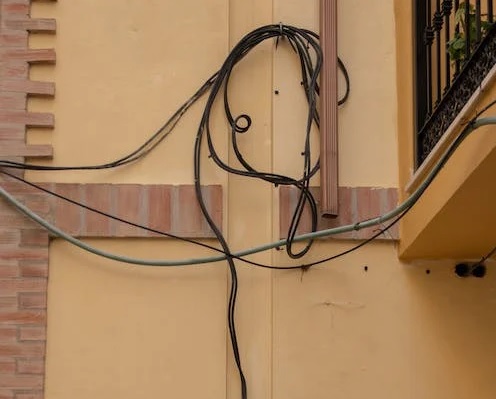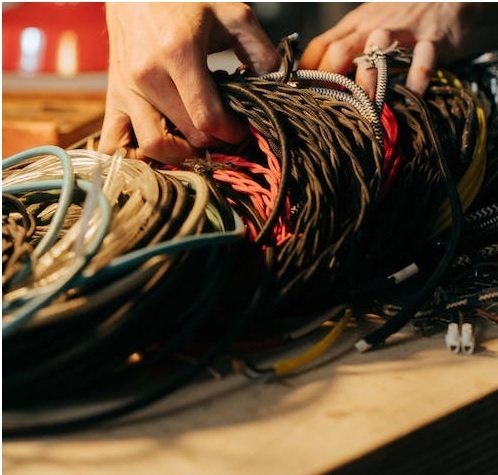About Electrical Wire Insulation: 14 Types, Explained.
27th Jan 2023
Cable insulation is an important component of any electrical wiring system. It is designed to protect the electrical current from the elements, reduce electrical noise, and provide a safe environment for the user. With so many different types of electrical cable insulation available, it’s important to understand the differences between them in order to select the right type for your application.
At EWCS Wire, we offer a wide range of electrical cables and insulation options. Cable and wire insulation will also vary according to the intended use of the conductor. For instance, our welding cables, marine electrical cables, and Belden fire alarm cables are all made with different types of insulation.
Moreover, each type of insulation’s chemical properties will impact its suitability for a given application. So, from PVC to rubber to Teflon and more, each type of insulation offers different benefits and features. In this blog post, we’ll provide an overview of the different types of cable insulation and explain the advantages and disadvantages of each.
- Polyvinyl Chloride (PVC): PVC is a popular insulation material due to its durability and affordability. It is a flexible material that can be used in a variety of applications, including power and signal wiring. For instance, our Belden fire alarm cables are made with fire-resistant, low-smoke PVC insulation with a rip cord to facilitate stripping. PVC is also resistant to oils, acids, and alkalis.
- Polyethylene (PE): PE is a thermoplastic material that is often used for low-voltage wiring. It is a lightweight material that is resistant to water, oils, and acids. It is also very flexible and can be used in a variety of applications.
- Polyurethane (PU or PUR): PU is a flexible material that is often used for insulated power and signal wiring. It is resistant to oils, acids, and alkalis, and is also resistant to abrasion and impacts. However, polyurethane is not widely used because it has poor electrical properties and is flammable.
- Polypropylene (PP): PP is a thermoplastic material that is often used for power and signal wiring. It is resistant to oils, acids, and alkalis, and is also resistant to abrasion and impacts.
- Fluoropolymer (FP): FP is a thermoplastic material that is often used for insulated power and signal wiring. It is resistant to oils, acids, and alkalis, and is also resistant to abrasion and impacts.

- Polytetrafluoroethylene (PTFE): PTFE is a thermoplastic material that is often used for power and signal wiring. It is resistant to oils, acids, and alkalis, and is also resistant to abrasion and impacts.
- Cross-linked Polyethylene (XLPE): XLPE is a thermoplastic material that is often used for power and signal wiring. It is resistant to oils, acids, and alkalis, and is also resistant to abrasion and impacts.
- Fluorinated Ethylene Propylene (FEP): FEP is another type of thermoplastic material that is often used for power and signal wiring. It is resistant to oils, acids, and alkalis, and is also resistant to abrasion and impacts.
- Ethylene Propylene Rubber (EPR): EPR is a rubber-like material that is often used for power and signal wiring. It is resistant to oils, acids, and alkalis, and is also resistant to abrasion and impacts.
- Silicone Rubber: Silicone rubber is a rubber-like material that is often used for power and signal wiring. It is resistant to oils, acids, and alkalis, and is also resistant to abrasion and impacts. Silicone insulation is also very flexible, making it easy to use in tight spaces or applications with frequent bending. The main disadvantage of silicone insulation is that it is not as resistant to heat as some other types of insulation and can become brittle at extreme temperatures.
- EPDM: EPDM, or ethylene propylene diene monomer, is widely used as an electrical insulator because it has a wide range of desirable properties. EPDM rubber is highly flexible, has decent abrasion resistance, and is resistant to ozone, heat, moisture, UV, alkali and acids, and even oxygenated solvents. Our welding cables are made using EPDM insulation.
- Teflon: Teflon insulation is a great option for applications where temperature extremes are a factor. It is highly resistant to heat and can withstand temperatures up to 500°F. Teflon insulation is also very lightweight and flexible, making it easy to use in tight spaces or applications with frequent bending. The main disadvantage of Teflon insulation is that it can be expensive and is not as durable as some other types of insulation.
- Fiberglass: Fiberglass insulation is a great option for many applications. It is highly durable and resistant to both moisture and abrasion. Fiberglass insulation is also very lightweight and flexible, making it easy to use in tight spaces or applications with frequent bending. The main disadvantage of fiberglass insulation is that it is not as resistant to heat as some other types of insulation and can become brittle at extreme temperatures.
- Nylon: Nylon insulation is a popular choice for many applications. It is highly durable and resistant to both moisture and abrasion. Nylon insulation is also very lightweight and flexible, making it easy to use in tight spaces or applications with frequent bending. The main disadvantage of nylon insulation is that it can be expensive and is not as resistant to heat as some other types of insulation.

High-Quality Electrical Wire and Cable at Great Prices
As you can see, there are many different types of cable insulation available. Each type has its own advantages and disadvantages, so it’s important to consider the specific requirements of your application before deciding which type of insulation is best for you. At EWCS Wire, we’re here to help you make the right choice. Contact us today to learn more about our selection of electrical cable insulation, or about our specialty electrical wire and cable, including but not limited to Belden fire alarm cables, marine electrical cables, flexible welding cable, armored cable, instrumentation cable, and more.

